टी-लैक 10 मिलीग्राम टैबलेट 10's
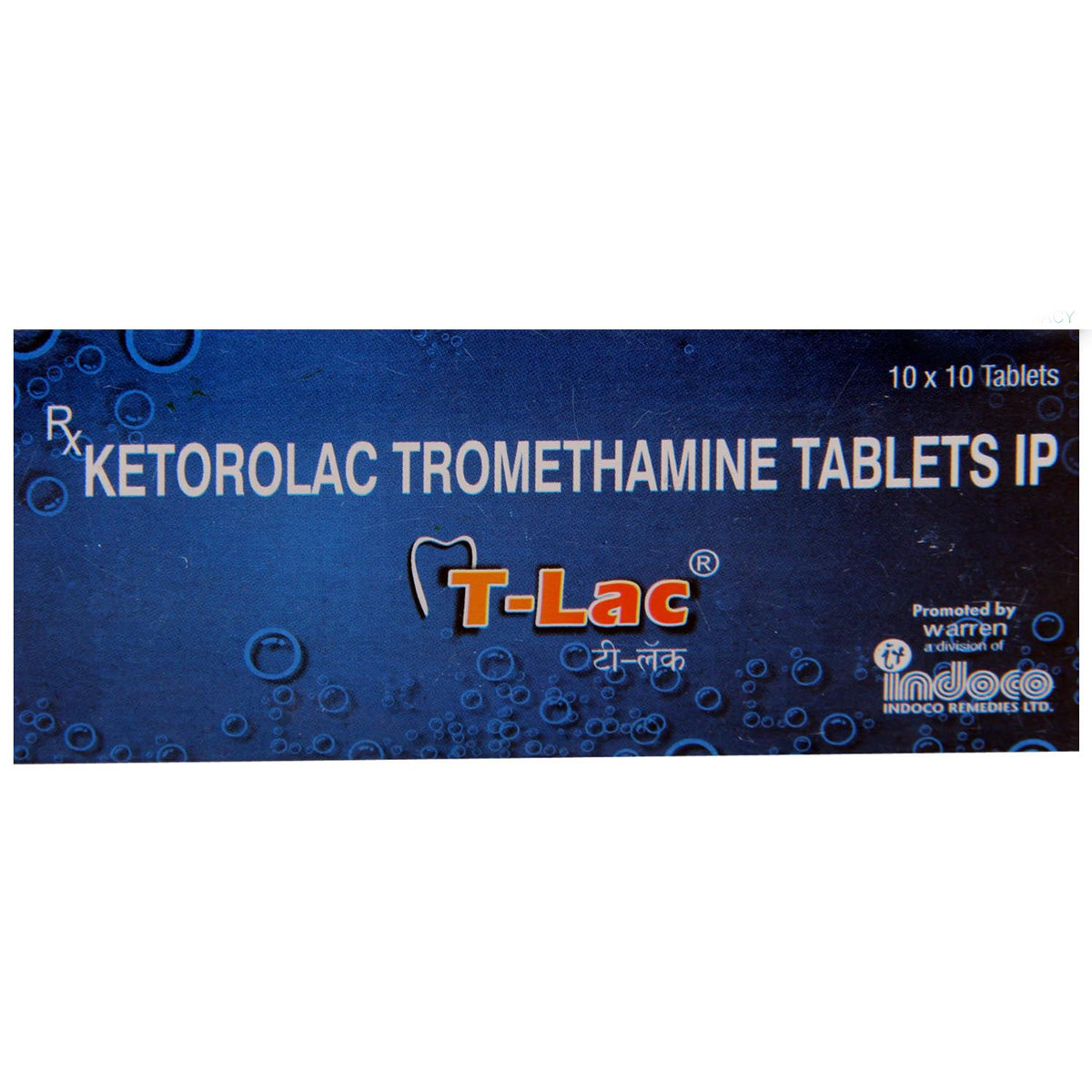
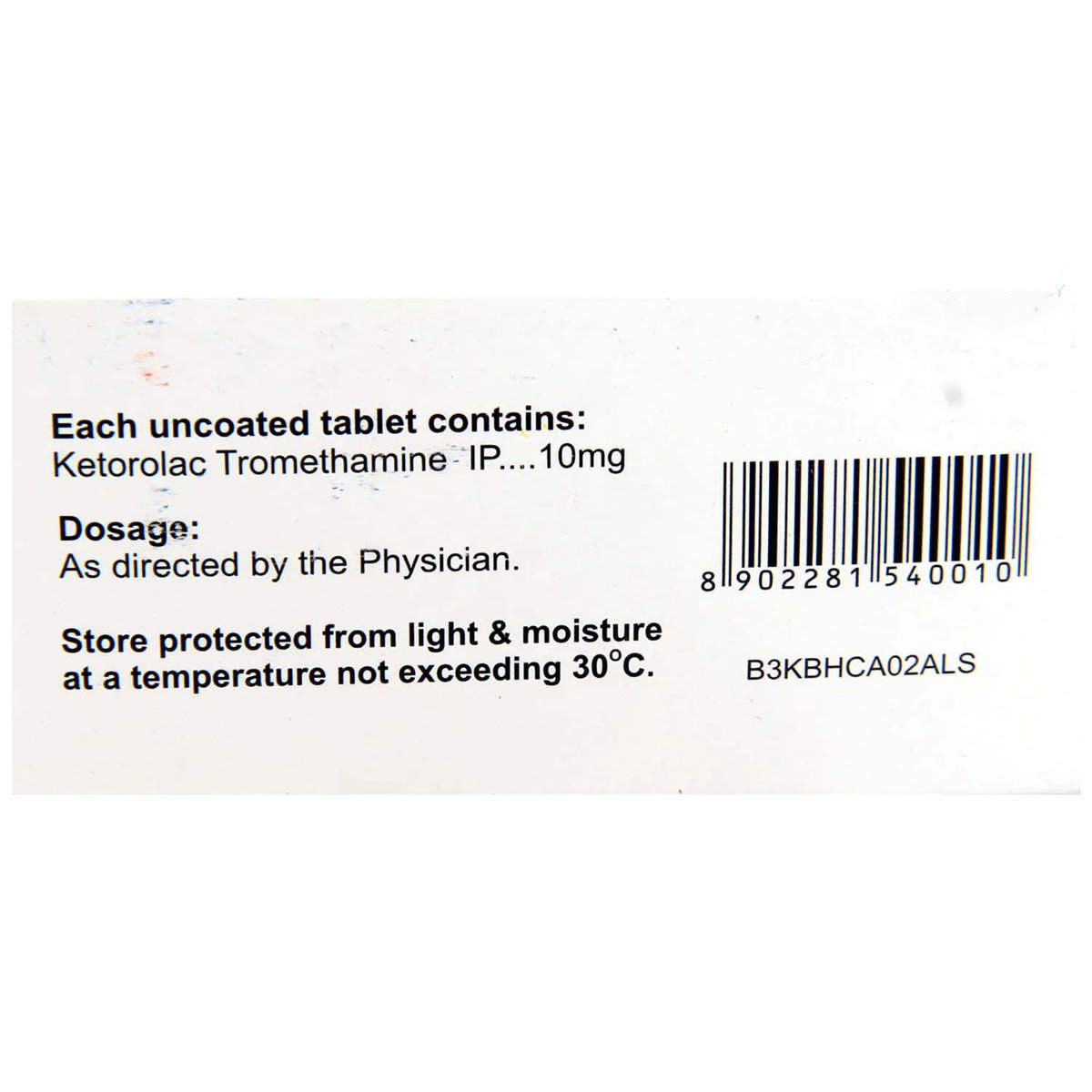
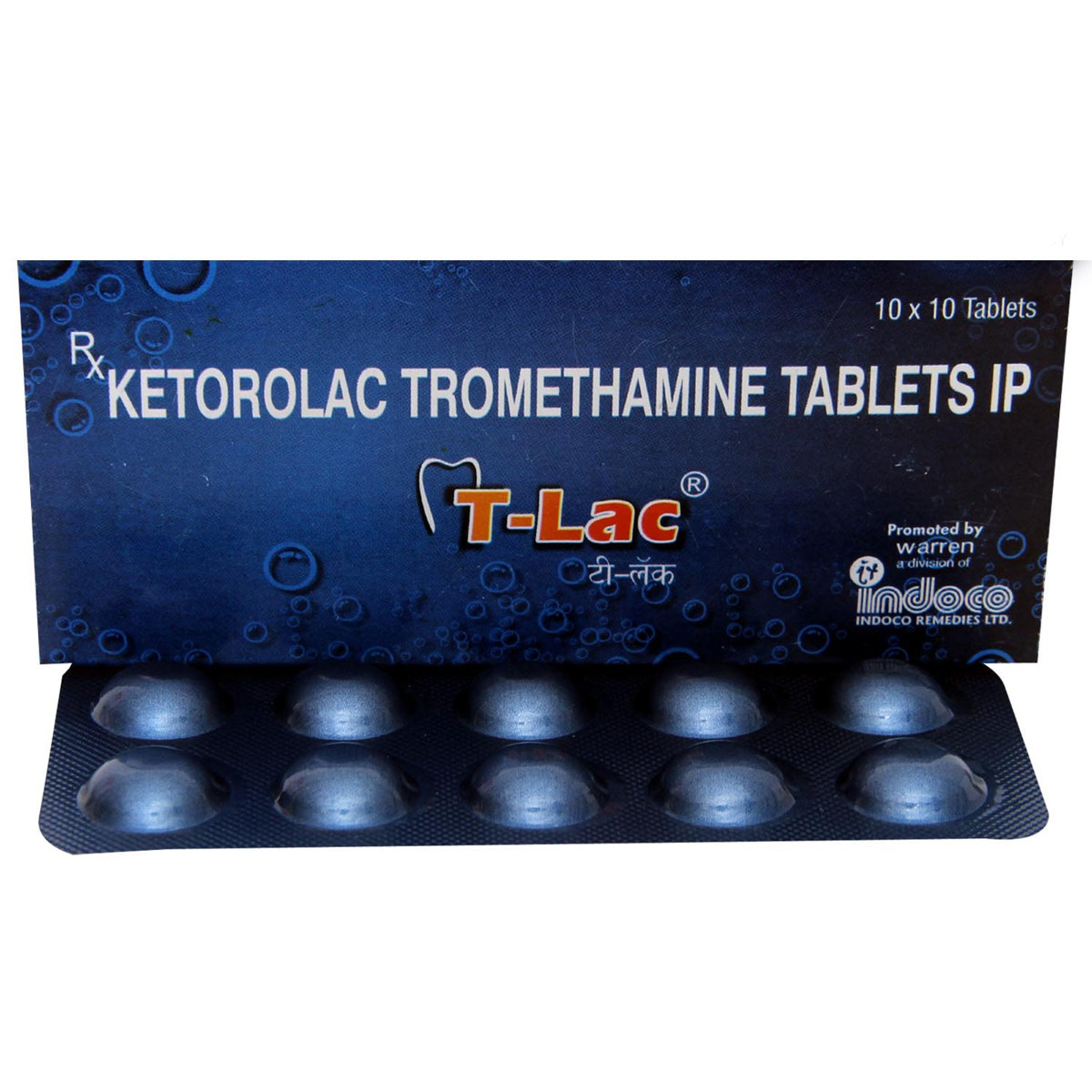
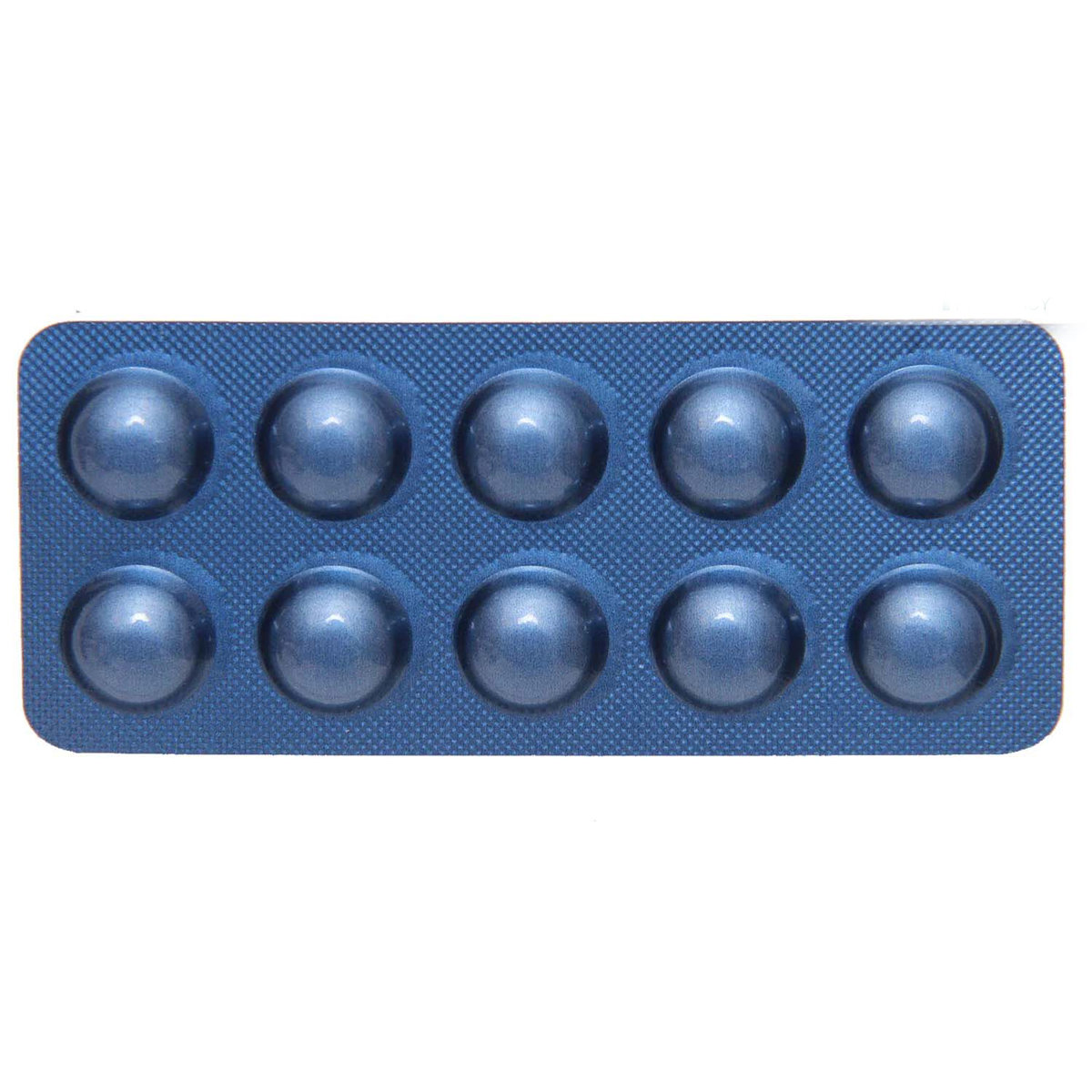
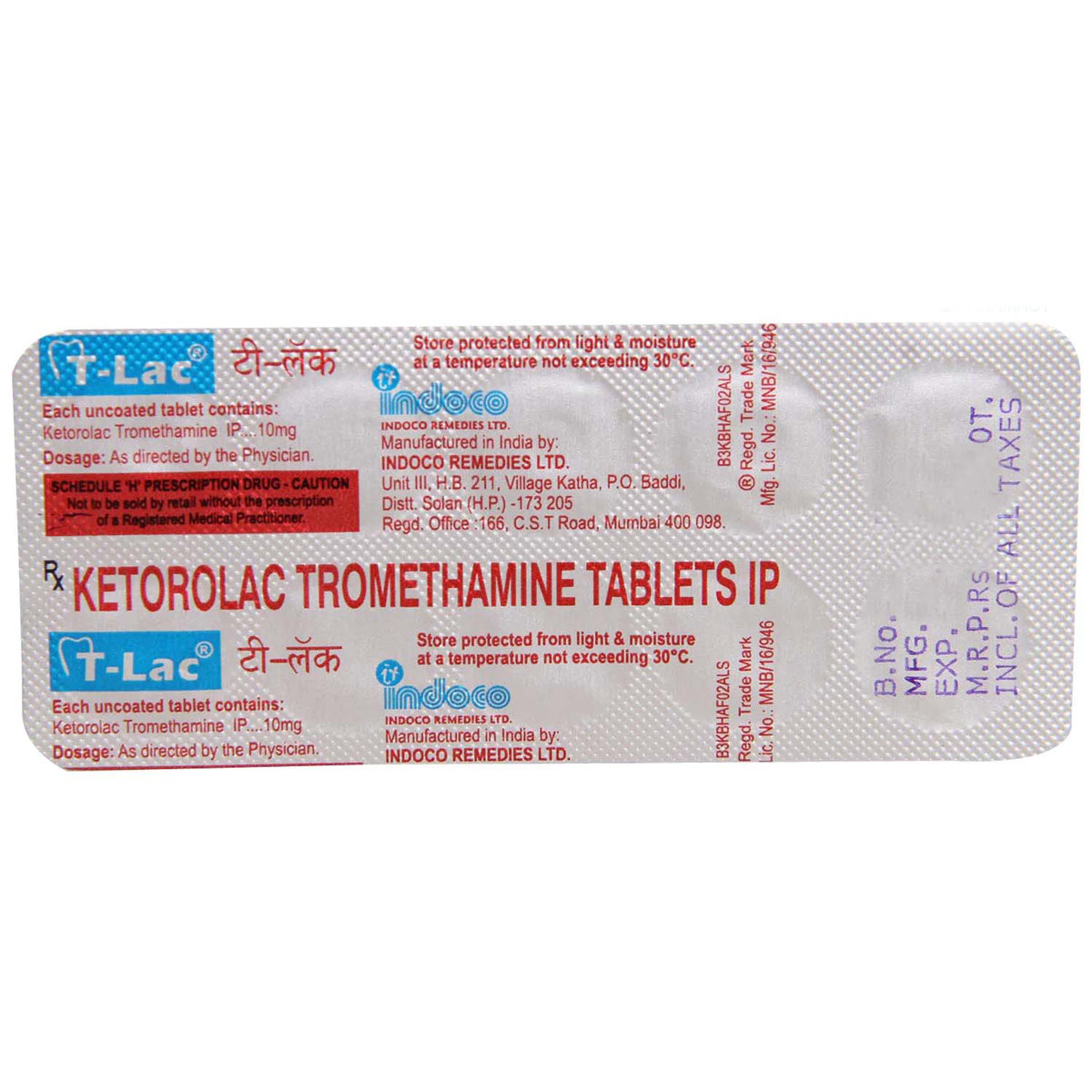
(Inclusive of all Taxes)
Get Free delivery (₹99)
Know Your Delivery Time
Provide Delivery Location

Secure Payment

India's Most Trusted Pharmacy

Genuine Products

Have a query?
- Drink water or other clear fluids.
- To prevent worsening of pain, limit intake of tea, coffee, or alcohol.
- Include bland foods like rice, toast, crackers, and rice in your diet.
- Avoid lying down immediately after eating as it may cause indigestion or heartburn.
- Avoid acidic and spicy food as it may cause indigestion.
- Drink ample water throughout the day to thin mucus and keep nasal passages moist.
- Utilize a humidifier, especially during dry seasons, to add moisture to the air.
- Limit exposure to cigarette smoke, dust, strong odours, and other environmental pollutants.
- Regularly use saline nasal spray to cleanse and moisturize nasal passages.
- Practice good hand hygiene to prevent spreading germs and avoid touching your nose unnecessarily.
- Elevate your head while sleeping to promote drainage from the sinuses.
- Identify and avoid known allergens through allergy testing and implement measures to reduce exposure like air purifiers.
- Inhale steam from a hot shower or bowl of water can help loosen mucus.
- Practice relaxation techniques like yoga or meditation to manage stress which can exacerbate nasal discomfort.
- Maintain a balanced diet rich in fruits and vegetables to support immune function.
- Hydrate your body: Drink enough water to prevent dehydration and headaches.
- Calm Your Mind: Deep breathing and meditation can help you relax and relieve stress.
- Rest and Recharge: Sleep for 7-8 hours to reduce headache triggers.
- Take rest: lie down in a quiet, dark environment.
- Cold or warm compresses can help reduce tension.
- Stay Upright: Maintain good posture to keep symptoms from getting worse.
- To treat headaches naturally, try acupuncture or massage therapy.
- Over-the-counter pain relievers include acetaminophen and ibuprofen.
- Prescription Assistance: Speak with your doctor about more substantial drug alternatives.
- Severe Headaches: Seek emergency medical assistance for sudden, severe headaches.
- Frequent Headaches: If you get reoccurring headaches, consult your doctor.
- Headaches with Symptoms: Seek medical attention if your headaches include fever, disorientation, or weakness.
- Take medications with food (if recommended): It can help prevent stomach distress and indigestion.
- Eat smaller, more frequent meals: Divide daily food intake into smaller, more frequent meals to ease digestion.
- Avoid trigger foods: Identify and avoid foods that trigger indigestion, such as spicy, fatty, or acidic foods.
- Stay upright after eating: Sit or stand upright for at least 1-2 hours after eating to prevent stomach acid from flowing into the oesophagus.
- Avoid carbonated drinks: Avoid drinking carbonated beverages, such as soda or beer, which can worsen indigestion.
- Manage stress: To alleviate indigestion, engage in stress-reducing activities like deep breathing exercises or meditation.
- Consult a doctor if needed: If indigestion worsens or persists, consult a healthcare professional to adjust the medication regimen or explore alternative treatments.
- Inform your doctor about the nausea and discuss possible alternatives to the medication or adjustments to the dosage.
- Divide your daily food intake into smaller, more frequent meals to reduce nausea.
- Opt for bland, easily digestible foods like crackers, toast, plain rice, bananas, and applesauce.
- Avoid certain foods that can trigger nausea, such as fatty, greasy, spicy, and smelly foods.
- Drink plenty of fluids, such as water, clear broth, or electrolyte-rich beverages like coconut water or sports drinks.
- Use ginger (tea, ale, or candies) to help relieve nausea.
- Get adequate rest and also avoid strenuous activities that can worsen nausea.
- Talk to your doctor about taking anti-nausea medication if your nausea is severe.
- Record when your nausea occurs, what triggers it, and what provides relief to help you identify patterns and manage your symptoms more effectively.
- Inform your doctor about your constipation symptoms. They may adjust your medication or advise alternative treatments.
- Stay hydrated by drinking sufficient of water (at least 8-10 glasses a day) to help soften stool and promote bowel movements.
- Increase fibre intake by eating foods high in fibre, such as fruits, whole grains, vegetables and legumes, to help bulk up the stool.
- Establish a bowel routine by trying to go to the bathroom at the same time each day to train your bowels.
- Engaging in regular exercise, like walking or yoga, can support in bowel movement stimulation.
- Consult your doctor if constipation persists, and discuss alternative treatments or adjustments to your medication.
- Include iron-rich foods like dark leafy vegetables, lean red meat, legumes and fish in your diet.
- Consume vitamin C-rich foods as they aid iron absorption.
- Limit tea, cocoa, and coffee as these can slow iron absorption.
- Exercise regularly; however, do not overdo it.
Drug-Drug Interactions
Drug-Drug Interactions
Login/Sign Up
Co-administration of Cidofovir with T-Lac 10 mg Tablet can increase the risk of kidney problems.
How to manage the interaction:
Taking T-Lac 10 mg Tablet with Cidofovir is not recommended, please consult your doctor before taking it. However, if you experience nausea, vomiting, loss of appetite, increased or decreased urination, sudden weight gain or loss, fluid retention, swelling, shortness of breath, muscle cramps, tiredness, weakness, dizziness, confusion, or an irregular heart rhythm, consult a doctor. Do not discontinue any medications without consulting a doctor.
Taking T-Lac 10 mg Tablet with Flurbiprofen can increase the risk of side effects in the gastrointestinal tract such as inflammation, bleeding, ulceration.
How to manage the interaction:
Taking Flurbiprofen with T-Lac 10 mg Tablet is not recommended, but it can be taken if your doctor has advised it. However, if you experience dizziness, lightheadedness red or black, tarry stools, coughing up or vomiting fresh or dried blood that looks like coffee grounds, severe headache and weakness contact your doctor immediately. Do not discontinue any medications without first consulting your doctor.
Using T-Lac 10 mg Tablet together with oxaprozin may increase the risk of side effects in the gastrointestinal tract such as inflammation, bleeding and ulcers.
How to manage the interaction:
Taking T-Lac 10 mg Tablet with Oxaprozin is not recommended, but it can be taken together if prescribed by a doctor. However, consult your doctor if you experience any unusual bleeding, dizziness, lightheadedness, red or black, tarry stools, coughing up or vomiting fresh or dried blood that looks like coffee grounds, severe headache, and weakness. Do not discontinue any medications without consulting a doctor.
Coadministration of T-Lac 10 mg Tablet together with ketoprofen may increase the risk of side effects in the gastrointestinal tract such as inflammation, bleeding and ulcers.
How to manage the interaction:
Taking T-Lac 10 mg Tablet with Ketoprofen is not recommended, but it can be taken together if prescribed by a doctor. However, consult your doctor if you experience any unusual bleeding, dizziness, lightheadedness, red or black, tarry stools, coughing up or vomiting fresh or dried blood that looks like coffee grounds, severe headache, and weakness. Do not discontinue any medications without consulting a doctor.
Using T-Lac 10 mg Tablet together with tolmetin may increase the risk of side effects in the gastrointestinal tract such as inflammation, bleeding and ulceration.
How to manage the interaction:
Taking T-Lac 10 mg Tablet with Tolmetin is not recommended, but it can be taken together if prescribed by a doctor. However, consult your doctor if you experience any unusual bleeding, dizziness, lightheadedness, red or black, tarry stools, coughing up or vomiting fresh or dried blood that looks like coffee grounds, severe headache, and weakness. Do not discontinue any medications without consulting a doctor.
Using T-Lac 10 mg Tablet together with nabumetone may increase the risk of side effects in the gastrointestinal tract such as inflammation, bleeding and ulcers.
How to manage the interaction:
Taking T-Lac 10 mg Tablet with Nabumetone is not recommended, but it can be taken together if prescribed by a doctor. However, consult your doctor if you experience any unusual bleeding, dizziness, lightheadedness, red or black, tarry stools, coughing up or vomiting fresh or dried blood that looks like coffee grounds, severe headache, and weakness. Do not discontinue any medications without consulting a doctor.
Taking T-Lac 10 mg Tablet with Pentoxifylline can increase the risk of bleeding.
How to manage the interaction:
Taking Pentoxifylline with T-Lac 10 mg Tablet is not recommended, but can be taken together if prescribed by a doctor. However, if you experience dizziness, lightheadedness, red or black tarry stools, coughing up or vomiting fresh or dried blood that looks like coffee grounds, severe headache, and weakness contact you doctor immediately. Do not discontinue any medications without consulting a doctor.
Using T-Lac 10 mg Tablet together with salsalate may increase the risk of side effects in the gastrointestinal tract such as inflammation, bleeding and ulcers.
How to manage the interaction:
Taking Salsalate with T-Lac 10 mg Tablet is not recommended, but it can be taken together if prescribed by a doctor. However, consult your doctor if you experience any unusual bleeding, dizziness, lightheadedness, red or black, tarry stools, coughing up or vomiting fresh or dried blood that looks like coffee grounds, severe headache, and weakness. Do not discontinue any medications without consulting a doctor.
Co-administration of T-Lac 10 mg Tablet and Aspirin may increase the risk of side effects.
How to manage the interaction:
Taking T-Lac 10 mg Tablet with Aspirin is not recommended but can be taken together if prescribed by a doctor. However, consult a doctor if you experience unusual bleeding or bruising, dizziness, tarry stools, coughing up or vomiting fresh or dried blood, severe headache and weakness. Do not stop using any medications without talking to a doctor.
Co-administration of T-Lac 10 mg Tablet with Meloxicam together can increase the risk of side effects in the gastrointestinal tract such as inflammation, bleeding and ulcers.
How to manage the interaction:
Taking T-Lac 10 mg Tablet with Meloxicam is not recommended as it can lead to an interaction, but it can be taken if advised by your doctor. However, if you experience any symptoms like dizziness, lightheadedness, red or black, dark stools, coughing or vomiting fresh or dried blood that looks like coffee grounds, severe headache, and weakness, consult the doctor immediately. Do not stop using any medications without a doctor's advice.
Drug-Food Interactions
Drug-Food Interactions
Login/Sign Up
FAQs
Disclaimer
Author Details
We provide you with authentic, trustworthy and relevant information
Buy best C.n.s Drugs products by
Intas Pharmaceuticals Ltd
Sun Pharmaceutical Industries Ltd
Torrent Pharmaceuticals Ltd
Alkem Laboratories Ltd
Abbott India Ltd
Alteus Biogenics Pvt Ltd
Cipla Ltd
Micro Labs Ltd
Lupin Ltd
D D Pharmaceuticals Pvt Ltd
Ipca Laboratories Ltd
Tripada Healthcare Pvt Ltd
Arinna Lifesciences Ltd
Icon Life Sciences
Mankind Pharma Pvt Ltd
Linux Laboratories Pvt Ltd
East West Pharma India Pvt Ltd
Cnx Health Care Pvt Ltd
La Renon Healthcare Pvt Ltd
Talent India Pvt Ltd
Eris Life Sciences Ltd
Leeford Healthcare Ltd
Tas Med India Pvt Ltd
Emcure Pharmaceuticals Ltd
Macleods Pharmaceuticals Ltd
Consern Pharma Ltd
Zydus Healthcare Ltd
Troikaa Pharmaceuticals Ltd
Dr Reddy's Laboratories Ltd
Jagsam Pharma
Sigmund Promedica
Aristo Pharmaceuticals Pvt Ltd
Ardent Life Sciences Pvt Ltd
Zydus Cadila
Ikon Pharmaceuticals Pvt Ltd
Matias Healthcare Pvt Ltd
Shine Pharmaceuticals Ltd
Wockhardt Ltd
Theo Pharma Pvt Ltd
Propel Healthcare
Crescent Formulations Pvt Ltd
Lifecare Neuro Products Ltd
Reliance Formulation Pvt Ltd
Matteo Health Care Pvt Ltd
Mesmer Pharmaceuticals
Morepen Laboratories Ltd
Ajanta Pharma Ltd
Neon Laboratories Ltd
Capital Pharma
Med Manor Organics Pvt Ltd
Lyf Healthcare
Msn Laboratories Pvt Ltd
Sanix Formulation Pvt Ltd
Akumentis Healthcare Ltd
Pulse Pharmaceuticals
Brainwave Healthcare Pvt Ltd
Sanofi India Ltd
Solvate Laboratories Pvt Ltd
Cyrus Remedies Pvt Ltd
Elder Pharmaceuticals Ltd
Hetero Healthcare Pvt Ltd
Psyco Remedies Ltd
Medishri Healthcare Pvt Ltd
Alniche Life Sciences Pvt Ltd
Novartis India Ltd
Crescent Therapeutics Ltd
Hbc Life Sciences Pvt Ltd
Mova Pharmaceutical Pvt Ltd
Cadila Healthcare Ltd
Tripada Lifecare Pvt Ltd
Talin Remedies Pvt Ltd
Prevego Healthcare & Research Pvt Ltd
Serotonin Pharmaceuticals Llp
Solis Pharmaceuticals
Alembic Pharmaceuticals Ltd
Glenmark Pharmaceuticals Ltd
Infivis Life Care
Kivi Labs Ltd
Quince Lifesciences Pvt Ltd
Trion Pharma India Llp
Gagnant Healthcare Pvt Ltd
A N Pharmacia Laboratories Pvt Ltd
Primus Remedies Pvt Ltd
Crescent Pharmaceuticals
Glarizonto Pharma Pvt Ltd
Knoll Healthcare Pvt Ltd
Lia Life Sciences Pvt Ltd
Lyceum Life Sciences Pvt Ltd
Medopharm Pvt Ltd
Vasu Organics Pvt Ltd
Wallace Pharmaceuticals Pvt Ltd
Zuventus Healthcare Ltd
Arches Pharmaceuticals
Blue Cross Laboratories Pvt Ltd
Cadila Pharmaceuticals Ltd
Corona Remedies Pvt Ltd
Glial Life Science Llp
Lincoln Pharmaceuticals Ltd
Maneesh Pharmaceuticals Ltd
USV Pvt Ltd










